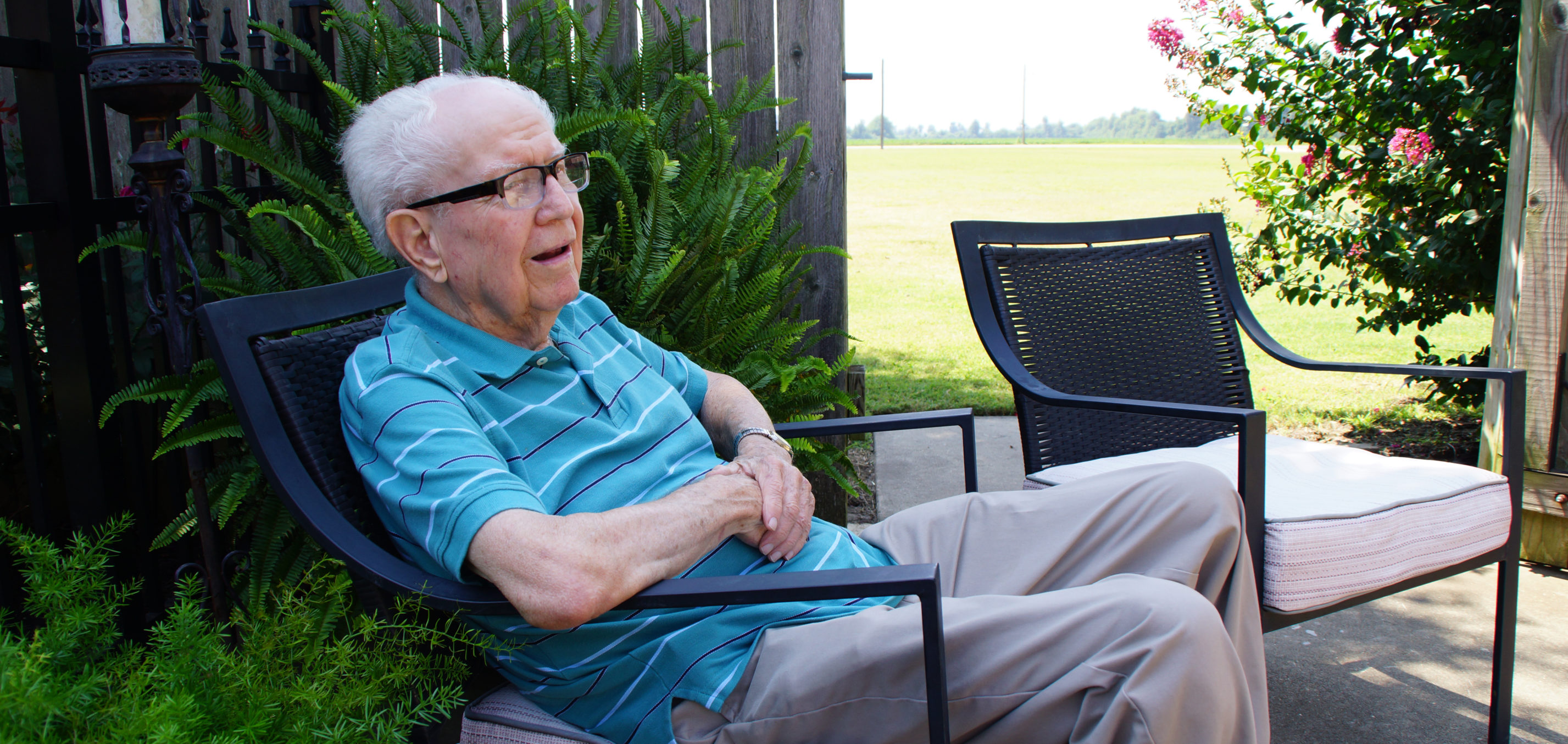A Tribute to My Grandfather
My grandfather, Melvin Shoults, passed away on Friday, September 29th. I had the privilege of performing his funeral on Monday, October 2nd in Portageville, Missouri. It was hard but also an incredible opportunity to honor a man who made a significant difference in my life. Below is what I shared during my funeral message.
An Inheritance to His Children’s Children:
A Loving Tribute to My Grandfather
Proverbs 13:22
King Solomon writes in Proverbs 13:22, 22 A good man leaves an inheritance to his children’s children. A good man leaves an inheritance to his children’s children. This morning I want to speak to you about the inheritance that my grandfather Papa left to his three grandchildren—my brother Jason (the first grandchild, which makes him arguably the favorite), my cousin Emily (the second grandchild and the only granddaughter, which makes her arguably the favorite), and then there’s me (the third and final and sweet and endearing and loving grandchild which may lead a few other wise souls to conclude that I’m the favorite…but we’ll settle that discussion another day). The point is this and I believe that I can speak for Jason and Emily when I say just how profoundly thankful the three of us are that Papa was our grandfather. We are profoundly thankful. The subtle yet indelible influence that he has had on our lives is nearly impossible to quantify and yet we can say this with certainty—apart from Papa’s quiet but relentless love and care and support and encouragement and prayers for each of us over the course of our lives, our lives today would be very different. We are profoundly thankful to God that Papa was and is our grandfather. This gift of grace is truly humbling. We echo the words of David in Psalm 16 where he writes—the lines have fallen for us in pleasant places. How good God has been to each of us, not just to Papa’s family and grandchildren—how good God has been to all of us who had the privilege of knowing this man. How do we even begin today to offer a worthy tribute? But we’ll try.
22 A good man leaves an inheritance to his children’s children. I want to speak to you this morning about the inheritance that Papa left to his three grandchildren.
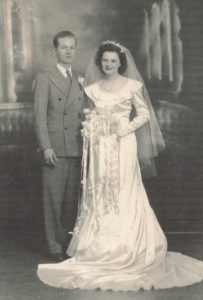 Papa left to us AN INHERITANCE OF STRONG MARRIAGE. How we can talk about Papa without talking about Nanney? We can’t because these two were two peas in a pod, a one-two punch. A previous pastor here referred to them as “the honeymooners” because they were always holding hands and because it was apparent for all to see just how much they loved one another. They were both born in Ste. Genevieve, Missouri, grew up three houses apart, started dating when Nanney was at the University of Missouri, and were married in Ste. Genevieve on February 8, 1947 when Papa was 19 and Nanney was 18. That’s right, if you do the math, they were married for 70 years. In a society that treats marriage as trivial and disposable, let us not underestimate the significance of Nanney and Papa’s marriage. Their faithfulness and their love and their affection towards one another after all of these years made a gentle but loud statement in Portageville and elsewhere—this is how marriage works, this is marriage as God intends—for richer, for poorer; for better, for worse; in sickness and in health; till death do us part. The Apostle Paul writes in Ephesians 5 that marriage is a picture of Christ’s love for His church and I can’t think of any marriage I know that reflected this reality more than Nanney and Papa’s.
Papa left to us AN INHERITANCE OF STRONG MARRIAGE. How we can talk about Papa without talking about Nanney? We can’t because these two were two peas in a pod, a one-two punch. A previous pastor here referred to them as “the honeymooners” because they were always holding hands and because it was apparent for all to see just how much they loved one another. They were both born in Ste. Genevieve, Missouri, grew up three houses apart, started dating when Nanney was at the University of Missouri, and were married in Ste. Genevieve on February 8, 1947 when Papa was 19 and Nanney was 18. That’s right, if you do the math, they were married for 70 years. In a society that treats marriage as trivial and disposable, let us not underestimate the significance of Nanney and Papa’s marriage. Their faithfulness and their love and their affection towards one another after all of these years made a gentle but loud statement in Portageville and elsewhere—this is how marriage works, this is marriage as God intends—for richer, for poorer; for better, for worse; in sickness and in health; till death do us part. The Apostle Paul writes in Ephesians 5 that marriage is a picture of Christ’s love for His church and I can’t think of any marriage I know that reflected this reality more than Nanney and Papa’s.
As grandchildren, we’ve been able to witness first-hand their relationship and marriage over a number of years and I think I can speak for Jason and Emily when I say that their marriage brought stability and confidence to our marriages. Their marriage inspired our marriages. Jason and I observed Papa and how he treated Nanney and we learned how we’re to love and sacrifice and provide for our wives. Now, I must pause and say that not everything we observed from Papa over the years translates very well to our marriages today. For example, we’d often be at the dinner table with Nanney and Papa and we’d all be sitting down eating and more often than not, something would be missing from the table that Papa needed which would prompt Papa to say to Nanney, “Babe, why don’t you get whatever it was that he needed.” “Babe, why don’t you hop up and get the pepper.” Or “Babe, why don’t you hop up and get the bread” or whatever it happened to be. Though I learned how this is supposed to work from Papa I knew better than to try that after I got married myself. If I need pepper and my wife is already at the table, it’s best if I just hop up and get the pepper myself.
Papa cared for Nanney until the very end. He loved her. He served her. He provided for her. Most would agree he spoiled her. He brought dinner to her every evening at 4:30 as she sat in her chair. And he did all of this in the context of a long, faithful, loving, God-honoring marriage.
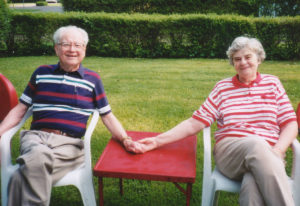 A few days ago as I began preparing for the service, I asked the family to describe Papa in one word and several apt words were suggested—caring, integrity, legacy, humble, faithful. Nanney had not chimed in at this point so I asked her to describe Papa to me in one word and without hesitation, she said, “fabulous.” After 70 years of marriage she describes Papa in this way. She also remarked that Papa was “the best husband she ever had.” 22 A good man leaves an inheritance to his children’s children. Papa left to us AN INHERITANCE OF STRONG MARRIAGE.
A few days ago as I began preparing for the service, I asked the family to describe Papa in one word and several apt words were suggested—caring, integrity, legacy, humble, faithful. Nanney had not chimed in at this point so I asked her to describe Papa to me in one word and without hesitation, she said, “fabulous.” After 70 years of marriage she describes Papa in this way. She also remarked that Papa was “the best husband she ever had.” 22 A good man leaves an inheritance to his children’s children. Papa left to us AN INHERITANCE OF STRONG MARRIAGE.
Papa also left to us AN INHERITANCE OF ROBUST FAITH. Again, how can we talk about Papa without talking about his faith and his involvement in his church? Nanney told us the other day about Papa’s morning routine. He’d get up pretty early, get the coffee going, and then he’d sit in his blue recliner in his living room and he’d read two things—a daily devotional from My Daily Bread and he’d read a passage from the Bible that was printed on his Scripture-of-the-day calendar. She remarked to me later how thankful she was to wake up each morning and come in to find Papa in the midst of this daily routine. She said, “Not many wives have this privilege.”
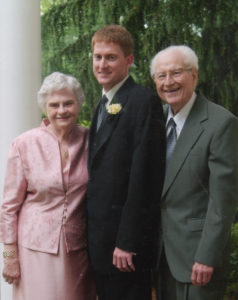 Papa’s commitment to God and his faith did not begin in recent years. We can easily trace this pattern of faith all the way back to Papa’s formative years. Nanney says the day after their honeymoon in Florida ended they rode the Sunday afternoon train from Ste. Genevieve to Portageville and that first night in town they attended church together that evening—this church, she says. My mother and my Aunt Carole remember how as a family growing up they would always pray before meals and read the Bible together and pray in the evenings before bed as a family. Aunt Carole’s husband Lew noticed immediately upon becoming part of our family how important Papa’s faith was to him. Uncle Lew says that Papa’s family is “Papa’s spiritual legacy” as his two daughters and their husbands, his three grandchildren and their spouses are all committed to their faith and are all involved church. Uncle Lew says this is no coincidence or accident—it’s a testimony to Papa’s own faith. Papa’s nephew John honored Papa’s faith in a book that we compiled for him last year when he turned 90: “A telegrapher, a railroad man, and most importantly, a man of faith and integrity from a generation that understood what these words truly mean. I am not his equal in these regards. Uncle Melvin has been a great advisor to me, never with his words (although he would have been willing if asked), but with his constant example of a life lived well: a life lived with humility, a life lived with grace, and a life lived with love for family, friends, and God.” I’m not sure Papa has ever been described so well.
Papa’s commitment to God and his faith did not begin in recent years. We can easily trace this pattern of faith all the way back to Papa’s formative years. Nanney says the day after their honeymoon in Florida ended they rode the Sunday afternoon train from Ste. Genevieve to Portageville and that first night in town they attended church together that evening—this church, she says. My mother and my Aunt Carole remember how as a family growing up they would always pray before meals and read the Bible together and pray in the evenings before bed as a family. Aunt Carole’s husband Lew noticed immediately upon becoming part of our family how important Papa’s faith was to him. Uncle Lew says that Papa’s family is “Papa’s spiritual legacy” as his two daughters and their husbands, his three grandchildren and their spouses are all committed to their faith and are all involved church. Uncle Lew says this is no coincidence or accident—it’s a testimony to Papa’s own faith. Papa’s nephew John honored Papa’s faith in a book that we compiled for him last year when he turned 90: “A telegrapher, a railroad man, and most importantly, a man of faith and integrity from a generation that understood what these words truly mean. I am not his equal in these regards. Uncle Melvin has been a great advisor to me, never with his words (although he would have been willing if asked), but with his constant example of a life lived well: a life lived with humility, a life lived with grace, and a life lived with love for family, friends, and God.” I’m not sure Papa has ever been described so well.
Emily has fond memories of early morning conversations she had with Papa about one of his favorite passages in the Bible, Romans 8:28—And we know that in all things God works for the good of those who love Him, who have been called according to His purpose. Papa and I had many conversations over the years about faith and church and I remember Papa telling me how me surrendering to the ministry and becoming a pastor changed how he viewed the work and calling of pastors. He always had a high regard for pastors but now he began to see things from the perspective of a pastor rather than just from the perspective of a church member. I can recall countless conversations with Papa about his church and how he longed to see his church healthy and growing. He would often fight back tears as he would speak about his love for his church and this instilled in me confidence that serving as a pastor was a worthwhile calling and that devoting my life in service to God and the local church was a good and noble vocation.
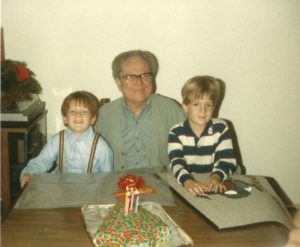 Papa served God through his church well over the years. He became a deacon in his early 30s and was even given the title Deacon Emeritus in 2012. He served on various pulpit committees. He taught children’s Sunday School classes a number of years ago, was always involved in the Men’s Brotherhood events. He thoroughly enjoyed being an active member of the J.M. Dameron men’s Sunday School class. It was here in this class that Papa made deep and lasting friendships with other men in his church—all of the pallbearers and honorary pallbearers are members of this class. Though Sunday School at First Baptist does not begin until 9:30, Papa left his house at 8:55 every Sunday morning in order to get to church early to socialize with the other men in his class who also left their houses early to get to Sunday school. In my experience, this kind of thing doesn’t happen very often. Mind you, Nanney and Papa’s house is only a mile or two down the road and traffic is typically not too heavy in Portageville on Sunday morning. Papa loved the class fish fry’s and the fellowship and camaraderie he experienced as a member of the class.
Papa served God through his church well over the years. He became a deacon in his early 30s and was even given the title Deacon Emeritus in 2012. He served on various pulpit committees. He taught children’s Sunday School classes a number of years ago, was always involved in the Men’s Brotherhood events. He thoroughly enjoyed being an active member of the J.M. Dameron men’s Sunday School class. It was here in this class that Papa made deep and lasting friendships with other men in his church—all of the pallbearers and honorary pallbearers are members of this class. Though Sunday School at First Baptist does not begin until 9:30, Papa left his house at 8:55 every Sunday morning in order to get to church early to socialize with the other men in his class who also left their houses early to get to Sunday school. In my experience, this kind of thing doesn’t happen very often. Mind you, Nanney and Papa’s house is only a mile or two down the road and traffic is typically not too heavy in Portageville on Sunday morning. Papa loved the class fish fry’s and the fellowship and camaraderie he experienced as a member of the class.
Papa’s faith and love for God and his church permeated every aspect of Papa’s life. 22 A good man leaves an inheritance to his children’s children. Papa left to us AN INHERITANCE OF ROBUST FAITH.
Papa also left to us AN INHERITANCE OF HUMILITY AND INTEGRITY. If a word or two other than “fabulous” had to be selected to describe Papa, these two words may suffice—Papa was a humble man and he was a man of integrity. These two qualities were evident in every aspect of his life—at home, at church, in the community, at work. As many of you know, Papa was a railroad man, working for Frisco which later became Burlington Northern and Papa was always concerned about how his actions would reflect on his family and his faith. Nanney says sometimes the railroad bosses would come to town and they’d want to eat at a certain establishment but Papa never went because he eating at this particular establishment would violate his conscience and he did not want to bring shame to his wife and young daughters at home. Papa was given a number of promotions with the railroad but he declined the final one because accepting the promotion would have required moving away from Portageville—something Papa would not do because again, he cared more about his wife and daughters than about financial success or climbing the corporate ladder. Papa often told the story that the man who ended up accepting the position that he was offered later became president of the railroad. Papa told Emily a few years ago that he often “wondered what could have been” but that he never regretted the decision he made to remain in Portageville.
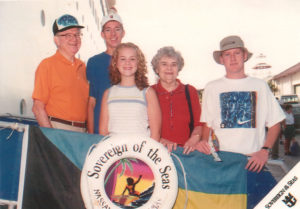 Papa’s friend Roger Crafton wrote to Papa about his character in the 90th birthday book: “I would like to let you know what an important person you have been in my life. You began showing an interest in me during my high school days and that still continues today. I have always admired your strong Christian witness and your love for your church has never wavered. I have told you before and I will say again that I feel the direction of our country is headed the way it is because men like me have not become men like you. You have never been afraid to draw a line in the sand and to stand for what is right. You might not realize it, but you have set such an example for all of us to follow.” We all know that Roger was right about Papa—he was never afraid to draw a line in the sand and to stand for what is right.
Papa’s friend Roger Crafton wrote to Papa about his character in the 90th birthday book: “I would like to let you know what an important person you have been in my life. You began showing an interest in me during my high school days and that still continues today. I have always admired your strong Christian witness and your love for your church has never wavered. I have told you before and I will say again that I feel the direction of our country is headed the way it is because men like me have not become men like you. You have never been afraid to draw a line in the sand and to stand for what is right. You might not realize it, but you have set such an example for all of us to follow.” We all know that Roger was right about Papa—he was never afraid to draw a line in the sand and to stand for what is right.
Papa’s humility and courtesy towards others has been seen in countless ways over the years but one story to me captures so much of who Papa was. Roger Crafton’s wife Carol wrote in the 90th birthday book about a PEO meeting in which Papa was the guest speaker. I also heard her mention this incident when they she and Roger came to visit Nanney a couple of days ago. Papa had been invited to this meeting of women to speak about the railroad and while Papa’s presentation was interesting and informative, what stuck out to Carol more than anything was what Papa did before the meeting even began. Listen to what she writes, “The most impressive part of his presentation was his behavior. Mr. Melvin was at the location for the meeting early. As each sister came into the room, Mr. Melvin stood up and recognized their presence. There were at least 15 members present. That was 15 times he stood up from his chair. Being a gentleman can be tiring, but he did not seem to mind.”
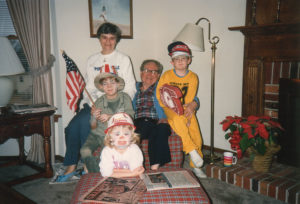 We all know Papa and we all know that he would not like all the fuss that’s being made about him over the past couple of days—the only thing he would enjoy about all of this was all of the food we’ve been eating. He was adamant that we didn’t make the 90th birthday book because he thought we were asking other people to brag about him—which we were because we thought Papa needed to know how loved he was and how much of a difference he had made in the lives of so many people.
We all know Papa and we all know that he would not like all the fuss that’s being made about him over the past couple of days—the only thing he would enjoy about all of this was all of the food we’ve been eating. He was adamant that we didn’t make the 90th birthday book because he thought we were asking other people to brag about him—which we were because we thought Papa needed to know how loved he was and how much of a difference he had made in the lives of so many people.
Papa was a humble man and he was a man who lived with integrity. 22 A good man leaves an inheritance to his children’s children. Papa left to us AN INHERITANCE OF HUMILITY AND INTEGRITY.
Papa also left to us AN INHERITANCE OF SERVING OTHERS. Not only did Papa devote his life to loving and serving Nanney and his family, he also spent time caring for others, especially widows. He looked after Vesta Barkovitz for a number of years after Bob passed away and he continued to do this with other women who found themselves without someone to help around the house and yard—some were part of his church and some weren’t, it didn’t really matter. After Papa’s morning routine at home was done, he’d often be seen making his way down MacArthur picking up newspapers or limbs or trash or mail or anything else that needed to be done just to lend a helping hand. Whenever I think of Papa and his care and concern for others, especially widows, I always think of James 1:27 which specifically links true religion with caring for widows. Why is this? Widows represent people who are susceptible and vulnerable, people who sometimes are in no position to “return the favor” so to speak. It’s easy to help someone who can help you in return but Papa often sought to help people who would not be able to repay. This is the type of serving that pleases God. This is an indicator that true faith has taken root.
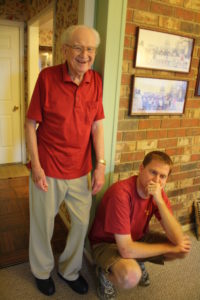 I’ve always known this but it has become even clearer to me in recent days that Papa was a man who showed no partiality. It didn’t matter to him if you were the mayor or the yardman, if you had money or didn’t, Papa would treat you the same. He’d greet you with a smile, a handshake or a hug, and then he’d genuinely care about you as a person. Papa didn’t notice or care if you were high society or no society, if you had a doctorate or were a high school dropout, Papa would help you if he could, he’d treat you with respect and dignity as an image bearer of God, and he’d welcome you into his home and ask Nanney to feed you dinner if you were hungry.
I’ve always known this but it has become even clearer to me in recent days that Papa was a man who showed no partiality. It didn’t matter to him if you were the mayor or the yardman, if you had money or didn’t, Papa would treat you the same. He’d greet you with a smile, a handshake or a hug, and then he’d genuinely care about you as a person. Papa didn’t notice or care if you were high society or no society, if you had a doctorate or were a high school dropout, Papa would help you if he could, he’d treat you with respect and dignity as an image bearer of God, and he’d welcome you into his home and ask Nanney to feed you dinner if you were hungry.
I’ll always be grateful for how Papa served others, especially widows. 22 A good man leaves an inheritance to his children’s children. Papa left to us AN INHERITANCE OF SERVING OTHERS.
Papa also left to us AN INHERITANCE OF LEARNING. Papa was a man about the town and another part of his daily routine was stopping at the bank and of course, stopping at the New Madrid County Library. Nanney says Papa would help get her situated on the couch for an afternoon rest and then off he’d go. Nanney says Papa did a lot of coming and going but that he’d always be back for lunch and dinner. Around 1:30 or so in the afternoon Papa could be found reading the paper or a magazine or socializing with the library employees or other friends in the library. Oftentimes Nanney would call me after Papa left when she wanted to discuss something with me that she didn’t want Papa to hear. Probably Jason and Emily could say the same thing. Papa loved to read—not books—but newspapers and magazines—The Wall Street Journal, Time, Newsweek, the St. Louis Post Dispatch when you could get it delivered in Portageville. Papa was very current on world events, he knew what was happening on Wall Street, he had definite opinions about government and politics. A friend of Papa’s stopped by the house a couple of days ago and said of Papa, even at 90, that he was “very sharp.” Another friend said of Papa, “If you want to know something about the stock market, just ask Melvin.” People often sought Papa’s advice because he was approachable, he was wise, and he had a constant desire to learn.
Papa loved to learn and this trait continued until his final days. 22 A good man leaves an inheritance to his children’s children. Papa left to us AN INHERITANCE OF LEARNING.
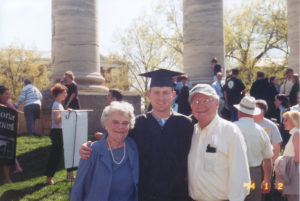 As you can see the inheritance that Papa left to his grandchildren is of far more significance and value than an any amount of monetary inheritance could ever be. Strong marriage, robust faith, humility and integrity, serving others, learning—all of these things point to the core of who Papa was and these are the things that we all found so compelling about this man. I know I can speak for Jason and Emily when I say once more just how grateful we are to have known him and loved him and how grateful we are to have been the recipients of his love and generosity. Papa was always there for us—at sporting events, at concerts, at graduations, at church activities. And he was always there for us with a kind word, a smile on his face, a word of encouragement and support.
As you can see the inheritance that Papa left to his grandchildren is of far more significance and value than an any amount of monetary inheritance could ever be. Strong marriage, robust faith, humility and integrity, serving others, learning—all of these things point to the core of who Papa was and these are the things that we all found so compelling about this man. I know I can speak for Jason and Emily when I say once more just how grateful we are to have known him and loved him and how grateful we are to have been the recipients of his love and generosity. Papa was always there for us—at sporting events, at concerts, at graduations, at church activities. And he was always there for us with a kind word, a smile on his face, a word of encouragement and support.
Why was Papa the way he was? What is it that formed and shaped and influenced him to be such a kind, selfless, and caring man? From my perspective, it was Papa’s unwavering faith in God and his trust in Jesus for salvation that made the difference. You see, Papa was a devout follower of Jesus and I think if Papa could speak to you today, he would encourage you to do the same. How do you do this? It’s simple enough for a child to understand but at the same time it’s so profound that the greatest theologians in the world can never exhaust its depths. How do we follow Jesus? We repent and we believe. We repent—we acknowledge our sin and we turn from our sin. Sin is what separates us from God and the Bible says we all have a sin problem. In order to follow Jesus we must repent of our sin and forsake it and lay it down. But we must also believe—believe that Jesus is the Son of God and that He willingly and lovingly died on the cross in our place for our sin and three days later He arose. When we repent and believe we are reconciled with God—there is no more enmity between us. Jesus absorbed the punishment we deserve for our sin and we receive grace upon grace. For God so loved the world that He gave His one and only Son that whosoever believes in Him shall not perish but have everlasting life.
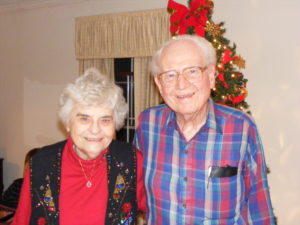 When we’d ask Papa how he was doing, he’d sometimes say, “I’m hittin’ on a hundred” and I believe today, friends, that he actually is. Our hope that Papa is in heaven today rests not on all the accolades I shared—not on his kindness or compassion or integrity or humility—as important as these things were and are. Our hope that Papa is in heaven and that he is “hittin’ on a hundred” is based on Jesus and Jesus alone. I exhort you today, repent and believe. Turn and trust.
When we’d ask Papa how he was doing, he’d sometimes say, “I’m hittin’ on a hundred” and I believe today, friends, that he actually is. Our hope that Papa is in heaven today rests not on all the accolades I shared—not on his kindness or compassion or integrity or humility—as important as these things were and are. Our hope that Papa is in heaven and that he is “hittin’ on a hundred” is based on Jesus and Jesus alone. I exhort you today, repent and believe. Turn and trust.
We’re going to miss Papa but we have hope that we’ll see him again. We have hope that he is in the presence of God right now because of what Jesus accomplished for him. I don’t know about you, but I’m already looking forward to seeing Papa again and I fully expect that our conversations there will end in the way that many of our conversations ended here over the years—with a warm smile, a hug or a handshake, and a friendly and helpful piece of advice from Papa: “Don’t take any wooden nickels.”
We love you, Papa.

